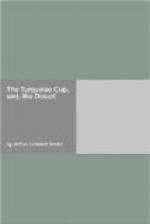The lawyer thought a moment. “Did you ever see a hunting-leopard?” he asked.
“No,” said the commandant.
“I used to see them,” said the lawyer, “when I was in Sumatra, looking after the affairs of some Frenchmen who were buying pearls from the oyster-beds of Arippo. They were horribly beautiful. Mirza reminds me of them, especially when she seizes her prey. Most beasts of prey are satisfied when they have killed all that they can devour; but the hunting-leopard kills because she loves to kill. So does Mirza. She destroys because she loves to destroy. A hunting-leopard and Mirza are the only two absolutely cruel creatures I have ever seen. Of course,” he added, “I eliminate the English, who deem the day misspent unless they have killed something, and who give infinite pains and tenderness to the raising of pheasants, that they may slaughter a record number of them at a battue. Aside from a hunting-leopard and a hunting-Englishman, I know of no being so cruel as Mirza; no being that takes such delight in mere extermination. They used to call our nobility, in the time of Louis XIV and Louis XV, cruel, but they did not kill, they merely taxed. In the height of the ancient regime, it was not good form to kill a peasant, because then the country had one less taxpayer. The height of the art was to take all the peasant had and then to induce him to set to work again. When he had earned another surplus, his lord came and took it. France had an accomplished nobility. England had a brutal one. The latter used to take all the eggs out of the nest and then kill the hen. The French noble took all the eggs but one or two, and spared the hen. He could rob a nest a dozen times and his English contemporary could rob it but once.”
“My friend,” said the commandant, laughing, “you reassure me. When you begin comparing England with France, I know that you have nothing of importance at hand and that your mind is kicking up its heels in vacation. You have a charming mind, my friend, but it has been prostituted to the law. If you had been bred a soldier—”
He stopped, because the murmur of the square suddenly stopped. The cessation of a familiar clamor is more startling than a sudden cry. The two men ran to the window. The fires under the pots were still burning and the square was light as day. At the opposite side, where the caravan road debouched, three thousand white-robed Mussulmans stood, silent. Above them the commandant and the lawyer could see the heads of the six spahis, they and their horses silent. Beyond, were the heads of many camels. The commandant threw up the sash. Across the silent square came a woman’s voice, speaking Arabic in the dialect of Ouled Nail.
“That is Mirza,” said the lawyer.
Then there came a man’s voice, evidently in reply.
“That is Abdullah,” said the lawyer.
“How can you distinguish at this distance?” asked the commandant.




